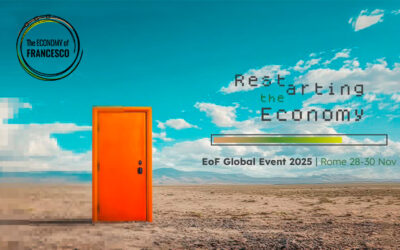Chiara wrote in 2006 «Throughout the Gospel Jesus invites to give. To give to the poor, to whoever asks, to whoever needs a loan. To give food to the hungry, a coat to the one who asks for a cloak, to give freely….He himself was the first to give: health to the sick, forgiveness to sinners, life to all of us. He encourages generosity to combat the selfish instinct to hoard, to focus on the other so as to overcome the focus on our own needs; to give so as to combat the culture of having”. The wedding One of my daughters was getting married and given our limited family economy it was difficult for us to cover all the expenses. With ten days to go I still did not have a suitable outfit for the day. Furthermore it was not easy to borrow from someone given my size. Just at that time a container arrived from Florence with clothes and household goods. It had been prepared and sent by some families in Italy for our community. A friend decided to look through the many things to see if she could find something for me. She was delighted to find a beautiful piece of material and even thought of the style of dress to make with it. On the wedding day whenever I was complemented on my outfit I replied that God’s providence made use of friends near and far. (M.A. – Paraguay) On Dialysis For three years now I have to have dialysis three times a week as I wait for a transplant. It’s not easy at the clinic and I try to build a relationship with each patient. If someone likes talking about food, I talk about food. If someone is interested in sport, we talk about sport. However one day I was particularly tired of fighting and my spirits were low. I hadn’t the energy to smile nor to greet people. A nurse who knew me well said “ You too, Aracelis?” Immediately the anguish and discouragement disappeared and I began to think of the others and not about myself. (Araceli J. – Brasil) Adopted I was always ashamed not to know my biological parents even though the family which adopted me did everything to fill the gaps. When I fell in love and then married K my problems, which seemed to have disappeared, surfaced again. In fact when it came to educating our children we had opposite opinions. I left her without giving any explanation. For those who have had a family it is difficult to understand someone who feels existentially alone. Now, after a long time, trying to draw out love from a dry heart is helping me to recover. (T.A.F. – Hungary) The challenge One day a colleague offers me a sheet of paper explaining that it is a phrase from the Gospel with a commentary to help live it. I read: “Love your enemies”. I reflected and the next day I am ready to take up the challenge. I found my mother in the kitchen. We haven’t spoken for two months. I sit down and have a coffee with her. “Did you sleep well?” I ask her. In the afternoon my brother comes to my room and asks me if he can borrow a jumper. “Open the cupboard and choose the one you want” I reply. These are small deeds but I already feel different. (A.F. – Italy)
by Chiara Favotti




0 Comments